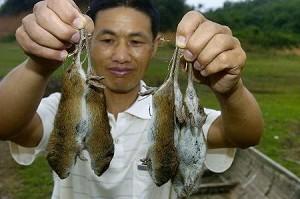A deluge of floodwaters from the Yangtze River has caused a swift rise in water level in Dongting Lake—China’s second largest freshwater lake—and has driven millions of rats from the lake islands into surrounding human habitats. Two local Government experts both warn that this is a sign of China’s deteriorating environment and could cause a serious outbreak of disease in a matter of days.
Datonghu District in Yiyang City, an area with a very serious rat infestation, reported killing approximately 100 tons of farm rats in just over 8 days. Villagers collected more than ten truckloads of rats to take away for burial.
According to Voice of America (VOA), Wang Guoping, the Vice Secretary of the Hunan Province Wild Life Conservation Association, said one major reason for the dramatic increase rats is the sharp reduction of the rats’ natural predators, snakes and birds of prey. The local population in Hunan eats snakes as food, and despite conservation laws, continues to catch wild snakes for decoration and artwork.






